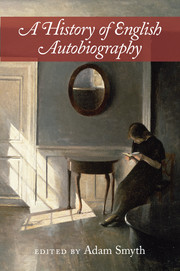Book contents
- Frontmatter
- Dedication
- Contents
- List of contributors
- 1 Introduction: The range, limits, and potentials of the form
- PART 1 AUTOBIOGRAPHY BEFORE ‘AUTOBIOGRAPHY’ (CA. 1300–1700)
- PART 2 RELIGION, GENDER, THINGS (CA. 1700–1800)
- PART 3 THE MANY NINETEENTH CENTURIES (CA. 1800–1900)
- PART 4 RELATIONAL LIVES AND FORMS OF REMEMBERING (CA. 1890–1930)
- PART 5 KINDS OF COMMUNITY (CA. 1930-CONTEMPORARY)
- 23 Poetry and autobiography in the 1930s: Auden, Isherwood, MacNeice, Spender
- 24 Documenting lives: Mass Observation, women's diaries, and everyday modernity
- 25 Postcolonial autobiography in English: The example of Trinidad
- 26 Around 2000: Memoir as literature
- 27 Illness narratives
- 28 Breaking the pact: Contemporary autobiographical diversions
- 29 The machines that write us: Social media and the evolution of the autobiographical impulse
- Index
- References
23 - Poetry and autobiography in the 1930s: Auden, Isherwood, MacNeice, Spender
from PART 5 - KINDS OF COMMUNITY (CA. 1930-CONTEMPORARY)
Published online by Cambridge University Press: 05 March 2016
- Frontmatter
- Dedication
- Contents
- List of contributors
- 1 Introduction: The range, limits, and potentials of the form
- PART 1 AUTOBIOGRAPHY BEFORE ‘AUTOBIOGRAPHY’ (CA. 1300–1700)
- PART 2 RELIGION, GENDER, THINGS (CA. 1700–1800)
- PART 3 THE MANY NINETEENTH CENTURIES (CA. 1800–1900)
- PART 4 RELATIONAL LIVES AND FORMS OF REMEMBERING (CA. 1890–1930)
- PART 5 KINDS OF COMMUNITY (CA. 1930-CONTEMPORARY)
- 23 Poetry and autobiography in the 1930s: Auden, Isherwood, MacNeice, Spender
- 24 Documenting lives: Mass Observation, women's diaries, and everyday modernity
- 25 Postcolonial autobiography in English: The example of Trinidad
- 26 Around 2000: Memoir as literature
- 27 Illness narratives
- 28 Breaking the pact: Contemporary autobiographical diversions
- 29 The machines that write us: Social media and the evolution of the autobiographical impulse
- Index
- References
Summary
The 1930s was a period in which autobiography flourished; it is also a period which occasioned what one may read as expressive silences. W. H. Auden dismissed the period as a ‘low dishonest decade’ (Auden 1977, 245) in ‘September 1, 1939’, but he has relatively little to say about the period in later years and he is often, though by no means always, circumspect about engaging in autobiography in the 1930s. Conversely, Stephen Spender and Louis MacNeice wrote autobiographically about the period during and after it. The period running from 1928 to 1939 marks a period in which individualism re-emerges as a major creative force. Often it is in dialectical conflict with accounts of the human that stressed ‘the tendency to consider oneself a product of circumstances and environment beyond one's control’ (Spender 1978, 106).
Samuel Hynes, noting the rise of autobiography as a form towards the end of the 1930s, comments on the dual nature of the genre. Autobiography, he notes, ‘is a kind of documentary’, yet it is also ‘a self-conscious art that may sometimes be read as parable’ (Hynes 1979, 322). The point is well made: autobiography in and of the period bears witness, yet it also constructs parable-like stories, and it does both things with a ‘self-conscious art’. This chapter will examine autobiography in the work of three poets: Spender, MacNeice, and Auden. It will do so by way of discussing the work of Christopher Isherwood, a novelist and prose autobiographer who collaborated with Auden and was a close friend of Spender.
Lions and Shadows (1938) by Isherwood exemplifies the ‘self-conscious art’ mentioned in the previous paragraph. As Hynes remarks, the work is at once a ‘portrait of the artist as a young man’ and ‘also a portrait of the artist's generation during its formative years’ (Hynes 1979, 323). It is extremely funny, its author ‘his own guinea-pig’, as ‘everyone must be’ ([7]), according to Isherwood in ‘To the Reader’ at the head of the work. It verges on parody as well as on fiction, even as it disclaims being, ‘in the ordinary journalistic sense of the word, an autobiography’: that is, Isherwood goes to say, in terms that suggest how the form is normally viewed, ‘it contains no “revelations”; it is never “indiscreet”; it is not even entirely “true”’ (Isherwood 1938, 7).
- Type
- Chapter
- Information
- A History of English Autobiography , pp. 331 - 344Publisher: Cambridge University PressPrint publication year: 2016
References
- 1
- Cited by

